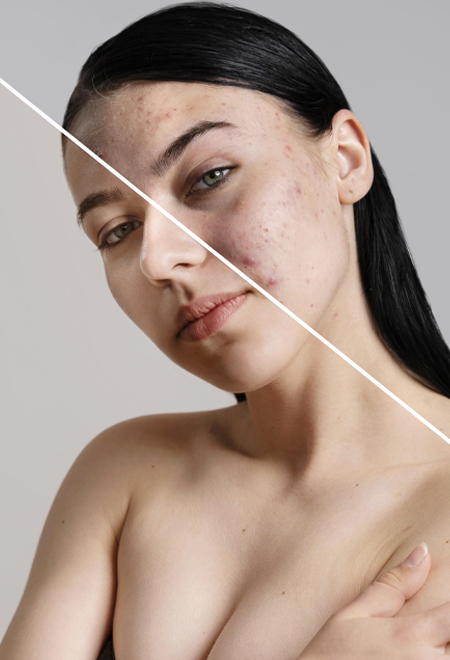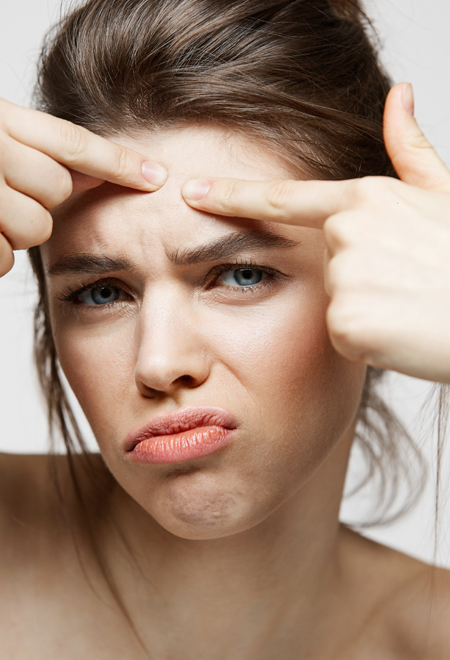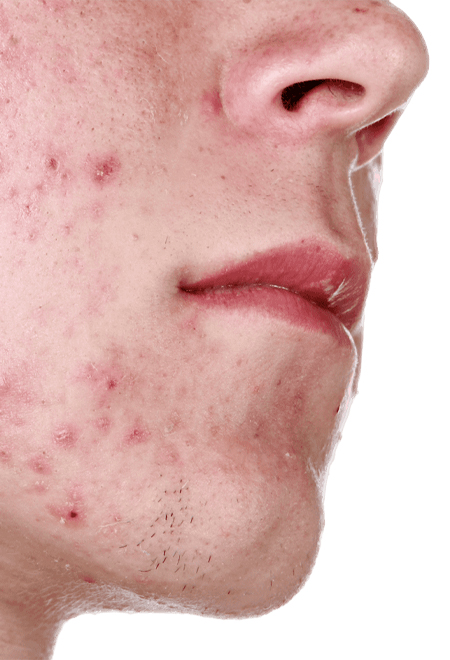Nişantaşı - İstanbul

Acne and Acne Treatment
Feel Free to Reach Out to Us Regarding Acne and Acne Treatment!
CONTACT USWhat is Acne?
Acne lesions occur when hormonal stimulation and accumulated sebum clog the pores where the hair follicles under the skin open to the skin, and the inflammatory process caused by bacteria accumulating in the clogged area begins.
Acne Vulgaris, commonly known as acne, is a sebaceous gland condition that can occur at any age, although it is more likely to be seen in adolescence. It is possible to treat this condition known as acne. Acne is a chronic condition that can cause anxiety, lack of self-confidence, social isolation, and depression, with the potential for intense scarring and disfigurement if left untreated.
It primarily affects the face, back, chest, shoulders, and abdomen and can be diagnosed with blackheads whiteheads, papules, pustules, and nodules, sometimes with more severe forms.
Why does Acne Occur?
When sebum secretion is triggered by hormones (adolescence, premenstrual period, polycystic ovary, even hormones passed from breast milk to the baby), and the sebum that accumulates on the skin, i.e. the skin secretion, clogs the hair follicle; inflammation occurs around the clogged hair follicle, resulting in acne in the form of blackheads, whiteheads, papules, pustules, and inflamed nodular forms that can be seen separately or together. Acne should be diagnosed examination and acne treatment should be planned accordingly.

What are the Different Types of Acne?
Acne is divided into many categories within itself:
– Acne Vulgaris
– Acne Fulminans
– Pomade Acne (Cosmetic Acne)
– Acne Conglobata
– Drug-induced Acne
– Occupational Acne
– Excoriated Acne
– Acne Mechanica
– Neonatal Acne etc.
Nutrition and Acne
The most common factors contributing to acne-prone skin include high glycemic index foods, fast food consumption, intake of packaged foods, carbonated drinks, and the consumption of milk and cheese. These factors can exacerbate the severity of skin lesions. Specifically, the components found in milk can trigger the development of acne. The consumption of skimmed or full-fat milk may lead to an increased risk of acne formation, although this increase is not observed with fermented milk products.
What is the Treatment?
To begin with, it is essential to evaluate the severity of the patient’s acne lesions for appropriate treatment. Based on this evaluation, the dermatologist determines the most suitable acne treatment for the patient. Depending on the examination diagnosis, a combination of oral and topical treatments may be prescribed or used separately.
Criteria for determining treatment include:
• Patient’s family history,
• Age,
• When it has started,
• Skin care products used by the patient,
• Severity and type of lesions,
• Use of sunscreen,
• History of previous acne treatment and the type of treatment.
Effective and early treatment is crucial for deep acne to prevent scarring, discoloration, and lasting skin damage.

Acne Treatment
Dermapen (microneedling), medical office peels, regular device or medical skin cleansing, non-ablative lasers (Q SW ND yag), fractional lasers (erbium), and fractional microneedle radiofrequency (gold needle) treatments are commonly used treatments for reducing acne in examination settings. These treatments are effective and can provide successful results without the need for oral treatment.
Patience and compliance with the treatment are crucial during the treatment process. It is important to understand that acne treatment is not a one-session process, and it takes time for the results to become apparent.
What Happens If Acne Is Left Untreated?
There is a perception in society that acne formation is usually associated with adolescence, but acne can also occur at later ages. If acne is left untreated, it may result in acne scars on the skin. Whether acne scars will disappear completely depends on the type of acne. The likelihood of scarring is significantly reduced with early-age acne treatment. In the treatment plan for the patient, it is a priority to consider the patient’s adaptation and plan accordingly based on risk and benefit ratios.
